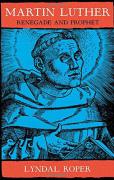This is the script of this morning's Thought for the Day on BBC Radio 4's Today programme:
I went into a bookshop last week to get a book I'd seen reviewed and, on a first look around the ground floor, couldn't find it. So, I went to the assistant and asked if they had the new biography of Martin Luther by Oxford academic Lyndal Roper. The conversation went something like this:

“You mean Martin Luther King?”
“No, I mean Martin Luther.”
“I've never heard of him. Who is he?”
“He was a German monk who set off the Reformation in Europe.”
“A German monk? He's probably in 'Religion'.
Eventually I went upstairs anyway and found it myself under 'German History'.
Well, I was a little alarmed about this. Not so much because of the religious illiteracy it demonstrated, but the historical ignorance. When I tweeted this exchange, a friend reminded me of the occasion when someone went into a bookshop and asked where he could find Oscar Wilde. The answer? “He's not in today.” Other funny comments followed.
Call me old-fashioned, but it is impossible to have any understanding of the modern world – especially modern Europe – without some reference to the German monk. And for me this is personal: I will be speaking in Luther's Erfurt at the end of October this year to kick off the 500th anniversary of the Reformation in Europe.
The challenge this presents is this: which histories need to be known if we are to know who we are and what got us to where we are? I lived and worked in the Cold War, so inhabited a divided Europe: my kids did not, and for them the Soviet Union is as remote as the Boer War. Yet, some histories shouldn't be ignored.
Luther was a complicated man: intense, argumentative and bad-tempered. He said some terrible things about Jews (which in turn had terrible consequences even four centuries later) and wasn't exactly a proto-feminist. He challenged one political power only to find himself colluding with others. He was brave, disciplined and sharp as a knife. He changed the German language for ever, and shaped what became the modern world by following up on an idea: that God loves us anyway.
In other words, Luther was a complex human being – just like the rest of us. We don't have to ignore his faults or take him out of his times in order to make him palatable to twenty-first century sensibilities. Praise him or damn him, we still have to take seriously what he did at the time he did it.
Essentially Luther was empowered by one simple discovery: we can never be perfect, but we can be liberated by knowing we are freely loved by God. 'Grace' it was called. It changed him, and he changed the world.
We see around us plenty of anger, strife and disputation. Surely it wouldn't be a bad thing to re-discover grace. And also to re-discover history.

